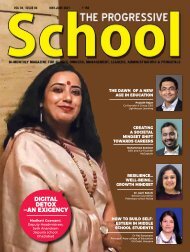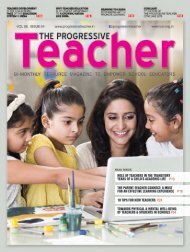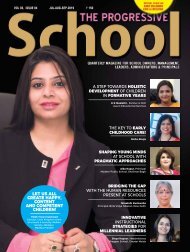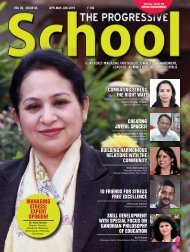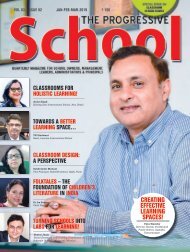The Progressive School Vol 02 Issue 04
The Progressive School is a quarterly magazine for school owners, leaders and principals. It will continue to address vital issues that impact the emerging challenges in the design, administration and growth of schools in all its dimension.
The Progressive School is a quarterly magazine for school owners, leaders and principals. It will continue to address vital issues that impact the emerging challenges in the design, administration and growth of schools in all its dimension.
Create successful ePaper yourself
Turn your PDF publications into a flip-book with our unique Google optimized e-Paper software.
Types of parents<br />
We are influenced by how we were<br />
raised (incorporating methods or doing<br />
the opposite). Parenting styles have<br />
been found to predict a child’s wellbeing<br />
in the area of social competence,<br />
academic performance and psycho-social<br />
development. <strong>The</strong> four parenting styles<br />
are Authoritarian Parents, Permissive<br />
Parents, Authoritative Parents, Rejecting/<br />
Neglecting Parents.<br />
Studies reveal that the decadesold<br />
parenting principle of being an<br />
Authoritative Parent is what our kids<br />
need today. This style of parenting relies<br />
on a balance between parental control<br />
and parental warmth. An Authoritative<br />
parent strives to have a strong, loving<br />
relationship with his children, yet they<br />
also provide high expectations and<br />
definite limits that help kids meet<br />
expectations. Children raised with this<br />
parenting style perform better in school,<br />
are less hostile and have greater selfesteem,<br />
they show more purpose and<br />
independence in their activities, are more<br />
self-reliant, more socially competent,<br />
have positive coping skills and have a<br />
clear understanding of acceptable and<br />
unacceptable behaviors.<br />
Strict parenting can turn children<br />
into adept liars as they do not feel safe<br />
telling the truth, experts have claimed.<br />
Psychotherapist Philippa Perry says a<br />
child should not be solely to blame for<br />
lying as the parenting style has a big<br />
impact on their ability readiness to fib.A<br />
study by Canadian psychologist Victoria<br />
Talwar, using the ‘Peeping Game’<br />
reinforced the claims. Examination two<br />
schools in West Africa, one with stricter<br />
rules and the other with a more laid back<br />
approach, researchers asked children to<br />
guess what object was making a noise<br />
in the game.<br />
According to game, people are asked<br />
to identify the objects by sound only,<br />
with the last one bearing no correlation<br />
to what it looks like. <strong>The</strong> researchers<br />
then left the room and on return<br />
Dr. Upendra Kaushik<br />
asked the children what the object was,<br />
and if they peeked. Talwar found that<br />
the number of students from the relaxed<br />
school who lied and told the truth<br />
was roughly on par with studies from<br />
other schools. But those from the strict<br />
school were quick to lie, and did it “very<br />
effectively.”<br />
Technology bombardment<br />
As a parent, we not only need to<br />
keep ourselves updated with parenting<br />
skills but also what is happening in our<br />
child’s life especially with the drastic<br />
changes/advancement in technology.<br />
Being online on social networking sites<br />
and apps is a part of children’s lives and<br />
with technology changing all the time<br />
and new apps, games and networks<br />
becoming popular day by day it can be<br />
difficult to keep up.<br />
<strong>The</strong> American Academy of Paediatrics<br />
(AAP) recommends monitoring the use<br />
of websites and social media platforms<br />
children visit by parents. “Technology<br />
per se is not bad. It is needed for the<br />
overall development of children. But<br />
overdependence on it is certainly a<br />
worrying trend. Such children often<br />
interact less with parents or avoid<br />
participating in real life activities,“<br />
said Dr. Kameshwar Prasad,<br />
Professor and Head of<br />
Neurology at AIIMS.<br />
Digital parenting<br />
isn’t different to offline<br />
parenting in many ways.<br />
What can be tricky is<br />
that the online world<br />
is often hidden from<br />
view and needs to be<br />
monitored closely.<br />
While in India, the<br />
data on overdependence on<br />
technology among pre-teens is<br />
scarce, global data suggests even<br />
six to ten years olds are hooked to<br />
technology that distracts and exposes<br />
children to online bullying, among other<br />
things. “We have come across many<br />
children who are good at solving tough<br />
puzzles in online or app-based games.<br />
But when they are asked to solve a<br />
simple mathematic equation, they find<br />
it difficult,“said Dr. Pravat Mandal,<br />
Professor of Neuroimaging at National<br />
Brain Research Centre. NBRC, he added,<br />
plans to take up the project to map the<br />
brain activity of children hooked to<br />
technology from a young age, and use it<br />
to assess the impact of technology.<br />
TOI had reported in February about<br />
two brothers who were addicted to gaming<br />
and required a month of rehabilitation in<br />
the psychiatry ward of Ram Manohar<br />
Lohia (RML) Hospital. Always engrossed<br />
in gaming, they had no time for studies,<br />
meals, bathing or changing clothes. <strong>The</strong>y<br />
slept fitfully, ignored phone calls and the<br />
doorbell, and twice turned a blind eye<br />
to robbers cleaning out their house. <strong>The</strong><br />
most odious symptom of their decline was<br />
the habit of defecating and urinating in<br />
their clothes while playing.<br />
For the first time, two psychiatrists<br />
claim to have proven through research<br />
that the obsessive need to post selfies<br />
or selftis is a mental condition and those<br />
suffering from it may need professional<br />
help. Janarthanan Balakrishnan from<br />
Thiagarajar <strong>School</strong> of Management in<br />
Madurai and Mark D Griffiths of UK’s<br />
Nottingham Trent University, the two<br />
researchers have based their claim on<br />
the responses they got from 400 young<br />
students pursuing management courses<br />
at two colleges in India, the names of<br />
which have not been disclosed. According<br />
to the researchers, they targeted Indian<br />
students because India has maximum<br />
Facebook users and it accounts for more<br />
selfie deaths in the world compared<br />
to any other country – with 76 deaths<br />
reported from a total 127 worldwide.<br />
In this research, results of which have<br />
been published in International Journal<br />
of Mental Health Addiction, the authors<br />
confirm three levels of selftis : borderline,<br />
acute and chronic. Borderline cases<br />
include people who take selfies at least<br />
three times a day but don’t post them<br />
on social media. Acute selftis involves<br />
people who post them on social media.<br />
<strong>The</strong> chronic sufferers are those who feel<br />
an uncontrollable urge to take selfies<br />
and post them more than six times daily.<br />
In their study involving the students —<br />
mostly aged between 16 and 25 years<br />
– 40-50% subjects fell in the category of<br />
acute selfitis, 34% were in the borderline<br />
category and 25.20% suffered chronic<br />
selfitis.<br />
www.progressiveschool.in<br />
JUL-AUG-SEP 2018<br />
THE PROGRESSIVE SCHOOL<br />
29




